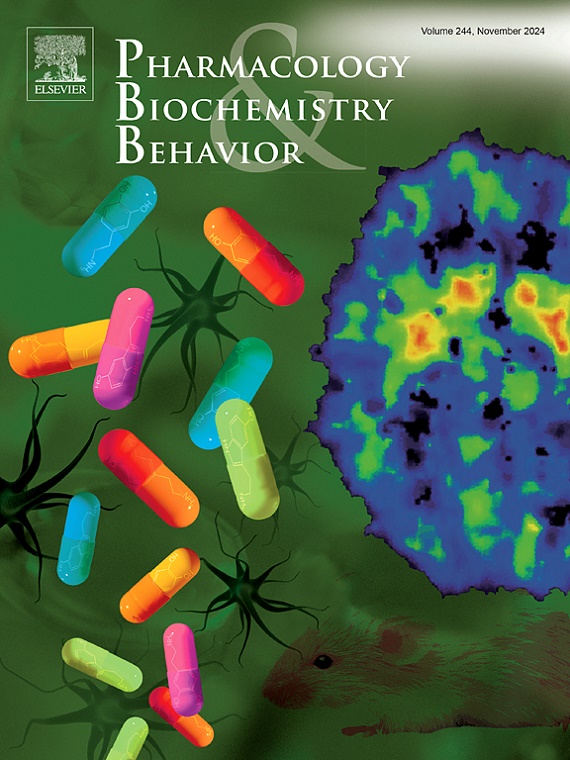Acute cannabidiol treatment reverses behavioral impairments induced by embryonic valproic acid exposure in male mice
IF 3.3
3区 心理学
Q1 BEHAVIORAL SCIENCES
引用次数: 0
Abstract
Cannabidiol (CBD), the major non-psychotomimetic compound of the Cannabis sativa plant, has shown promising effects in addressing various symptoms associated with autism spectrum disorder (ASD). This neurodevelopmental disorder typically impacts cognitive, behavioral, social communication, and motor skills domains. However, effective treatments for the wide range of symptoms associated with the disorder are limited and may trigger undesirable effects. Embryonic exposure to valproic acid (VPA, 500 mg/kg at 12° day embryonic age) in rodents is a consolidated environmental model for studying behavioral and molecular characteristics related to ASD. Therefore, this study aimed to evaluate whether acute CBD could reverse behavioral impairments in adult mice (eight weeks) exposed to VPA in the embryonic period in four distinct trials. In independent groups of animals, the following assays were conducted: I) Pre-Pulse Inhibition Test (PPI), II) Marble Burying, III) Social Interaction, IV) Actimeter Test, and V) Novel Object Recognition Test (NOR). In the PPI paradigm, mice exposed to VPA showed PPI impairment, and CBD (30 and 60 mg/kg) reversed this disruption. CBD (60 mg/kg) respectively decreased the number of buried marbles, improved social interaction time, but failed to reduce stereotyped-like movements in the VPA group. In NOR test CBD at both doses reversed the impairment in index of recognition induced in VPA group. These findings suggest that acute CBD administration can ameliorate behavioral impairments associated with ASD in a well-established animal model for studying this neurodevelopmental disorder.
急性大麻二酚治疗逆转雄性小鼠胚胎丙戊酸暴露引起的行为障碍。
大麻二酚(CBD)是大麻植物中主要的非精神类化合物,在治疗自闭症谱系障碍(ASD)相关的各种症状方面显示出良好的效果。这种神经发育障碍通常影响认知、行为、社会沟通和运动技能领域。然而,对与该疾病相关的广泛症状的有效治疗是有限的,并且可能引发不良影响。啮齿类动物胚胎暴露于丙戊酸(VPA, 12°d时500 mg/kg)是研究ASD相关行为和分子特征的综合环境模型。因此,本研究旨在通过四个不同的试验来评估急性CBD是否可以逆转胚胎期暴露于VPA的成年小鼠(8周)的行为障碍。在独立的动物群体中,进行了以下测试:I)脉冲前抑制测试(PPI), II)大理石掩埋,III)社会互动,IV)活度计测试,V)新目标识别测试(NOR)。在PPI模式中,暴露于VPA的小鼠表现出PPI损伤,CBD(30和60 mg/kg)逆转了这种破坏。CBD(60 mg/kg)分别减少了埋弹珠的数量,提高了社交互动时间,但未能减少VPA组的刻板动作。在NOR试验中,两种剂量的CBD均可逆转VPA组诱导的识别指数损伤。这些发现表明,在研究这种神经发育障碍的成熟动物模型中,急性给药CBD可以改善与ASD相关的行为障碍。
本文章由计算机程序翻译,如有差异,请以英文原文为准。
求助全文
约1分钟内获得全文
求助全文
来源期刊
CiteScore
6.40
自引率
2.80%
发文量
122
审稿时长
38 days
期刊介绍:
Pharmacology Biochemistry & Behavior publishes original reports in the areas of pharmacology and biochemistry in which the primary emphasis and theoretical context are behavioral. Contributions may involve clinical, preclinical, or basic research. Purely biochemical or toxicology studies will not be published. Papers describing the behavioral effects of novel drugs in models of psychiatric, neurological and cognitive disorders, and central pain must include a positive control unless the paper is on a disease where such a drug is not available yet. Papers focusing on physiological processes (e.g., peripheral pain mechanisms, body temperature regulation, seizure activity) are not accepted as we would like to retain the focus of Pharmacology Biochemistry & Behavior on behavior and its interaction with the biochemistry and neurochemistry of the central nervous system. Papers describing the effects of plant materials are generally not considered, unless the active ingredients are studied, the extraction method is well described, the doses tested are known, and clear and definite experimental evidence on the mechanism of action of the active ingredients is provided.

 求助内容:
求助内容: 应助结果提醒方式:
应助结果提醒方式:


